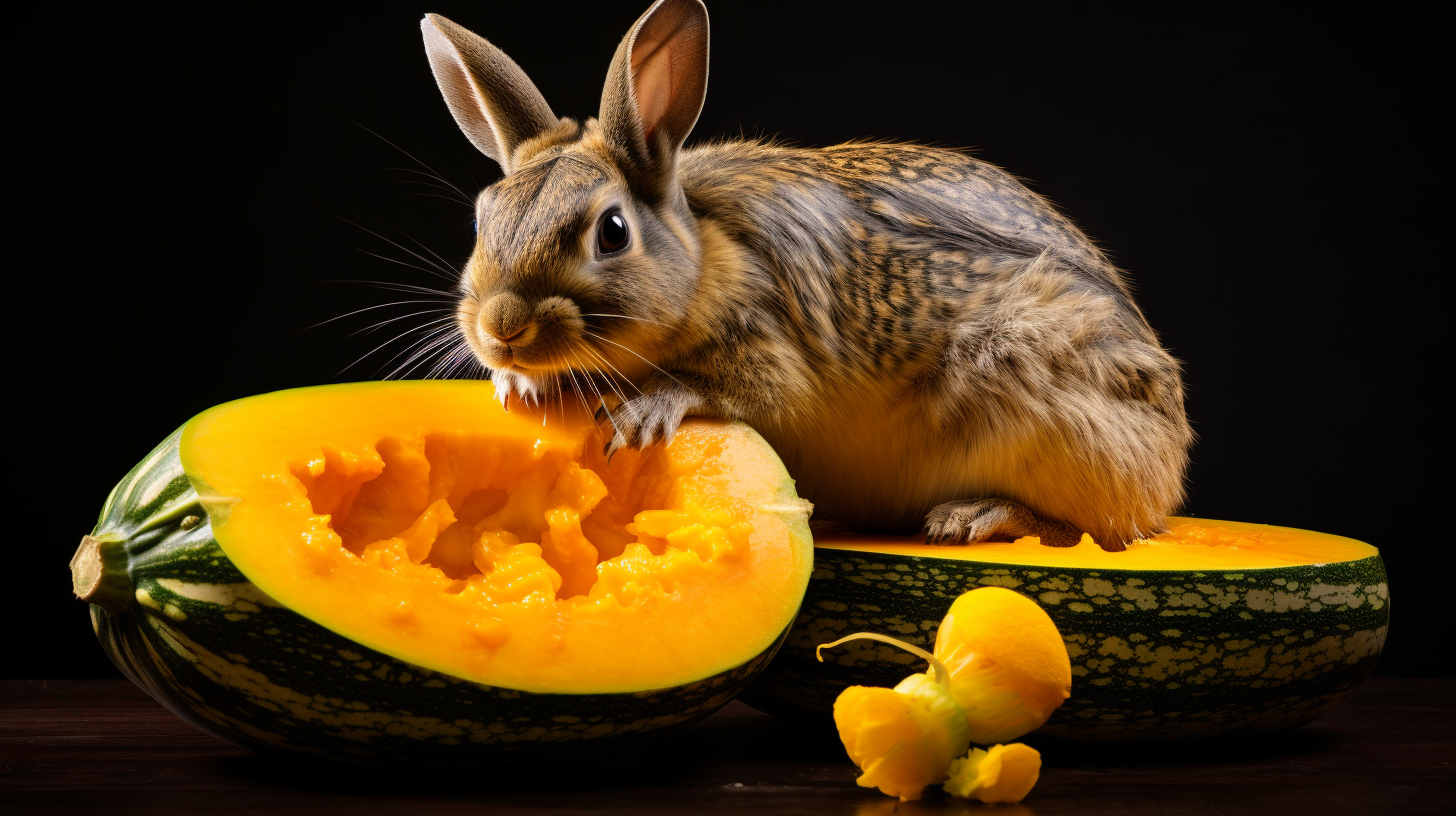Yes, rabbits can eat squash and it can be a healthy addition to their diet. Squash is a type of vegetable that belongs to the Cucurbitaceae family and comes in various varieties, such as butternut squash, acorn squash, and spaghetti squash. Rabbits are herbivores, which means that they primarily eat plant-based foods, including vegetables.
The Benefits of Feeding Squash to Rabbits
Feeding squash to rabbits can provide several benefits to their overall health and well-being. Squash is packed with vitamins and minerals that are essential for a rabbit’s health. It is a good source of vitamin A, which is important for maintaining healthy eyesight and promoting proper growth and development. Squash also contains vitamin C, which is an antioxidant that helps boost the immune system. Additionally, it is rich in potassium and magnesium, which are vital for maintaining proper muscle function and supporting a healthy nervous system.
In addition to its nutritional value, squash can also contribute to hydration in rabbits. Squash has a high water content, which can help keep your rabbit hydrated. Proper hydration is crucial for rabbits to maintain good overall health and to prevent conditions like bladder stones and urinary tract infections. Offering squash as a part of their diet can contribute to their daily water intake and promote proper hydration.
The dietary fiber found in squash can aid in digestion and promote a healthy gastrointestinal system in rabbits. It helps regulate bowel movements and prevents issues like constipation. Including squash in your rabbit’s diet can help keep their digestive system running smoothly.
Now that we’ve explored the benefits of feeding squash to rabbits, let’s take a closer look at the different types of squash and their nutritional value.
Types of Squash and Their Nutritional Value
There are several varieties of squash that you can feed to your rabbit. Each type has its own unique nutritional profile. Here are some common types of squash and their nutritional value:
1. Butternut Squash
Butternut squash is a popular choice for both humans and rabbits. It is rich in vitamin A, vitamin C, potassium, and dietary fiber. The sweet and nutty flavor of butternut squash is enjoyed by many rabbits, making it a great treat or addition to their daily meals.
2. Acorn Squash
Acorn squash is another type of squash that rabbits can enjoy. It is a good source of vitamin C, vitamin A, potassium, and dietary fiber. Acorn squash has a slightly sweet and nutty flavor, which may appeal to rabbits who have a preference for sweeter foods.
3. Spaghetti Squash
Spaghetti squash is a unique variety that is named for its stringy flesh, which resembles spaghetti noodles when cooked. While it may not be as nutritionally dense as other types of squash, it still contains important vitamins and minerals like vitamin C, vitamin A, and potassium. Spaghetti squash can be a fun and interactive addition to your rabbit’s diet, as they can pull apart the flesh with their teeth and paws.
When feeding squash to your rabbit, it’s important to keep a few things in mind to ensure their safety and well-being. Let’s explore some tips on how to feed squash to your rabbit in a safe and healthy way.
Tips for Feeding Squash to Your Rabbit
- Introduce squash gradually: Whenever you introduce a new food into your rabbit’s diet, it’s important to do so gradually. This allows their digestive system to adjust to the new food. Start by giving your rabbit a small amount of squash and monitor their response. If there are no adverse reactions, you can gradually increase the portion size.
- Fresh and organic: Choose fresh, organic squash whenever possible. This ensures that your rabbit is receiving the highest quality and most nutritious food. Avoid using canned or processed squash, as these may contain added sugars, salts, or preservatives that can be harmful to rabbits.
- Wash and prepare properly: Before feeding squash to your rabbit, make sure to thoroughly wash it to remove any dirt or pesticides. Remove the seeds and chop the squash into small, bite-sized pieces that are easy for your rabbit to eat. This helps prevent choking hazards and makes it easier for your rabbit to digest.
- Serve as a treat or supplement: While squash is a nutritious addition to your rabbit’s diet, it should be served in moderation. Treat it as a special treat or supplement to their regular diet of hay, fresh vegetables, and rabbit pellets. This helps ensure that your rabbit is getting a well-balanced diet.
- Monitor for allergies or digestive issues: Every rabbit is different, and some may have allergies or sensitivities to certain foods. It’s important to observe your rabbit’s behavior and digestive health when introducing squash into their diet. If you notice any adverse reactions such as diarrhea, gas, or changes in appetite, consult with a veterinarian.
Now that you have a better understanding of feeding squash to rabbits, you can safely incorporate this nutritious vegetable into your rabbit’s diet. Squash provides vitamins, minerals, and dietary fiber that contribute to their overall health and well-being. Just remember to introduce squash gradually, choose fresh and organic options, wash and prepare it properly, and monitor your rabbit for any allergies or digestive issues. By following these guidelines, you can provide your rabbit with a yummy and healthy treat.
Conclusion
Squash can be a healthy and nutritious addition to a rabbit’s diet. It provides important vitamins, minerals, and dietary fiber that promote overall health and well-being. Butternut squash, acorn squash, and spaghetti squash are just a few varieties that rabbits can enjoy.
When feeding squash to your rabbit, remember to introduce it gradually, choose fresh and organic options, properly wash and prepare it, and serve it as a treat or supplement. Observe your rabbit for any allergies or digestive issues that may arise, and consult with a veterinarian if needed.
Remember, a rabbit’s diet should primarily consist of hay, fresh vegetables, and rabbit pellets. Squash should be given in moderation and as part of a well-balanced diet. By following these guidelines, you can safely incorporate squash into your rabbit’s meals and provide them with a tasty and nutritious treat.
Key Takeaways
- Rabbits can eat squash as part of a balanced diet.
- Squash is rich in vitamins, minerals, and dietary fiber that promote overall health.
- Introduce squash gradually to prevent digestive issues.
- Choose fresh and organic squash whenever possible.
- Serve squash as a treat or supplement in moderation.
FAQ – Can Rabbits Eat Squash?
1. Can rabbits eat raw squash?
Yes, rabbits can eat raw squash. However, it’s important to wash it thoroughly and remove any seeds or tough parts before serving it to your rabbit.
2. Can rabbits eat the skin of squash?
While some rabbits may eat the skin of squash, it’s generally best to remove the skin before feeding it to your rabbit. The skin can be tough and difficult to digest.
3. Can rabbits eat cooked squash?
Yes, rabbits can eat cooked squash. Make sure to cook it without any added oils, salts, or spices. Let it cool down before offering it to your rabbit.
4. Can rabbits eat all types of squash?
Most varieties of squash are safe for rabbits to eat, but it’s best to stick to the commonly available types like butternut squash, acorn squash, and spaghetti squash. Avoid feeding your rabbit ornamental or decorative squash.
5. Can rabbits eat squash seeds?
It’s best to remove the seeds from squash before feeding it to your rabbit. While some seeds are safe for rabbits, it’s always safer to err on the side of caution and remove them.
6. Can rabbits eat squash leaves and vines?
Rabbits can eat the leaves and vines of some types of squash, but it’s important to ensure they are free from pesticides or other chemicals that may be harmful to your rabbit.
7. How often can I feed squash to my rabbit?
Squash should be fed to rabbits in moderation. It should be offered as a treat or supplement, and not make up the majority of their diet. Stick to a varied diet that includes hay, fresh vegetables, and rabbit pellets.
8. Can rabbits eat pumpkin?
Yes, rabbits can eat pumpkin. Pumpkin is a type of squash and has similar nutritional benefits. Make sure to serve it without any added sugars or spices.
9. Can rabbits eat zucchini?
Yes, rabbits can eat zucchini. Zucchini is a type of squash that is safe and nutritious for rabbits. Wash it thoroughly and serve it in small, bite-sized pieces.
10. Can rabbits eat all parts of the squash plant?
While rabbits can eat certain parts of the squash plant, such as the flesh and leaves, it’s important to avoid feeding them the stems and other tough parts that may be difficult to digest.
Remember to always monitor your rabbit’s health and consult with a veterinarian if you have any concerns about their diet or overall well-being.
Hey there, fellow nature enthusiasts! I’m Mark Gray, the passionate owner of OutdoorAnimals.com, a hub dedicated to uncovering the incredible world of outdoor animals. Whether you’re a hiker, a four-wheeler, or just someone who revels in the beauty of the great outdoors, you’re in the right place. I seek to understand all varieties of animals, from the great elk to the simple mouse, my goal is to write and share this knowledge with the public.

